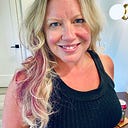be longing
Will I always long to belong? The fight to leave the margins and live on the page continues. Present. Tense.
I’ve longed to belong my whole life because I was always different. Not different in a “special” way, but in a weird way. Being different was not celebrated when I was growing up in the 80’s. Being different meant being bullied. I was already what is recognized today as being a “highly sensitive” child, which was bad enough: a square peg living in a world of round holes, and I did everything in my power to shave off those sharp edges that kept me from fitting in. I absolutely did not want to be a weird kid. But nothing makes the weird-o-meter go from zero to weirdo faster than to tell people you have a dead parent and that the surviving one lives with her girlfriend, in your house.
As a young kid, I didn’t have the vocabulary to understand why my household was so different from everyone else’s. Yet there was no assignment more terrifying than having to talk about my family. I remember one instance, in fifth or sixth grade, when I was put in the hot seat with a simple question: “Jaime, who lives with you?” I froze. This was a rare moment where I did not have a correct answer. The sheet of paper describing family structures we were given didn’t include anything resembling the situation currently playing out on North Eighteenth Avenue. As I attempted to explain, the teacher swooped in to rescue me. “Like Kate and Ally,” she suggested, referencing the short-lived sitcom. “Yes,” I exhaled. Close enough.
I wasn’t above lying about my life—the lies started almost immediately after my dad died. Lying was easier than understanding what had happened. I couldn’t decipher the whispers, code words, and incongruous emotional outbursts from family members. Lying was easier for them, too. No one wants to explain suicide to two small children--whose cumulative ages barely made one teenager—already shattered by the knowledge their dad was permanently gone; which was, on top of all of that, their first experience with death. It was definitely easier than answering the tragic follow-up questions. They didn’t know why he did it, either, or how God could let all of this happen. It was a terrible accident, they said. We would soon be told the truth, but it would not set me free. It would shackle me to the overwhelming shame that enveloped my entire family and would metastasize into every aspect of my life, for decades to come.
But lying about something in plain sight was much harder to do. Kate and Ally provided a pretty good cover story for me. This was the 80’s, there were no out lesbians on TV, and the premise of two divorced ladies moving in together with their kids seemed wholesome enough. Especially since the only gay people on TV at the time were the ones dying of AIDS. I didn’t even know what a “lesbian” was until middle school. But I would have dreams where my mom’s partner was a man, so I subconsciously understood the relationship, even if I could not name it, and understood it was hidden, even though no one told me I had a secret to keep.
So, my mom had a roommate. I didn’t have many friends over, as I’d have to explain the sleeping arrangements with more lies, and when I did, I would avoid the part of the house with the bedrooms, especially my mom and her girlfriend’s room, with one queen bed full of questions. We were all in the closet.
Luckily, I didn’t have many friends, so I was able to keep things pretty well under wraps. I think about that a lot now—how making friends was so much harder after everything changed. I lost my sense of belonging. I locked my little broken heart away and buried it under a dense layer of bluster and all the airs I would put on. Very few got close enough to see the cracks in my veneer. The first person I confided in about my dad was my boyfriend, when I was 18, and we had been together for more than two years. And appropriately for the time, we had a “don’t ask, don’t tell” policy about my mom, so I didn’t have any lies to confess or stories to correct.
I don’t have many regrets, but I regret how many connections with people I never made, out of a fear of not belonging. How that enveloping shame darkened my experiences growing up, and cut me off from my family, my town, my friends, my classmates. I was so separated, it’s like I wasn’t even there.
The shame is past, but I can feel it creep onto each fresh chapter of my life, like a bottle of ink spilling from the margin. The fear of not belonging appears, tense, a tightness in my chest, tearing at the weird-feeling scar tissue that covers my heart when it wants to expand. I fight the impulse to retreat to the margin, pushing through the pain to live on the page.
